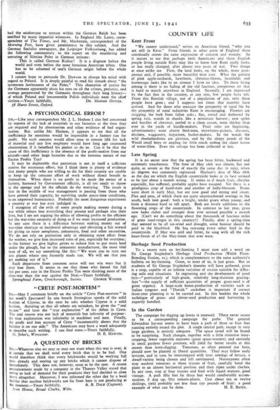COUNTRY LIFE
Kent Front " We cannot understand," writes an American friend, "why you are still in Kent." From friends in other parts of England there continually comes the same expression of concern and wonder. So it occurs to me that perhaps both Americans and those English people living outside Kent may like to know how Kent really looks. or has really changed, after almost two years of war. Two things at once strike me First, the land looks, on the whole, more pros- perous and, if possible, more beautiful than ever. What the pattern of pink apple-orchards, hawthorn, chestnut-bloom, beanfields and buttercups looks like to an airman I have no idea. To those living among it there is no fading of the old luscious, prosperous air that is hard to match anywhere in England. Secondly, I am impressed by the fact that in the country, at any rate, few people have left. From this Kentish village, out of a population of 250, only three people have gone ; and I suppose ten times that number have arrived. And for those who measure the prosperity of rural life by the prosperity of rural industries Kent is encouraging. Flawers are stripping the bark from fallen oaks ; flax, rotted and darkened by spring rain, stands in shocks, like a miniature harvest ; new spiles and hurdles of chestnut, peeled to a clean cream, seem thicker than ever in the yards of hurdle-makers. Fruit sales are beginning, advertisements want cherry bird-men, strawberry-pickers, shearers, ditchers, waggoners, horsemen, basket-makers. In the woods the wild rhododendrons are glorious, and by the sleepy ponds of the Weald small boys sit angling for little roach ambng the claret leaves of water-lilies. Even the salvage has been collected at last.


























 Previous page
Previous page